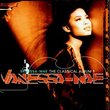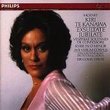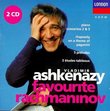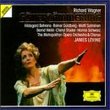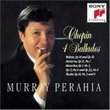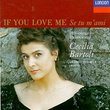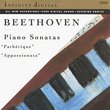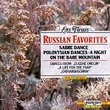| All Artists: Wolfgang Amadeus Mozart, Wilhelm Furtwängler, Vienna Philharmonic Orchestra, Anton Dermota, Cesare Siepi, Elisabeth Grummer, Elisabeth Schwarzkopf, Erich Kunz, Erna Berger, Irmgard Seefried, Otto Edelmann, Raffaele Arie, Walter Berry, Wilma Lipp Title: Mozart: Don Giovanni, K527 Members Wishing: 0 Total Copies: 0 Label: Gala Release Date: 6/6/2000 Album Type: Box set Genre: Classical Styles: Opera & Classical Vocal, Historical Periods, Classical (c.1770-1830), Modern, 20th, & 21st Century Number of Discs: 3 SwapaCD Credits: 3 UPCs: 675754392024, 759547160226 |
Search - Wolfgang Amadeus Mozart, Wilhelm Furtwängler, Vienna Philharmonic Orchestra :: Mozart: Don Giovanni, K527
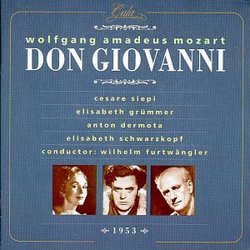 | Wolfgang Amadeus Mozart, Wilhelm Furtwängler, Vienna Philharmonic Orchestra Mozart: Don Giovanni, K527 Genre: Classical
|
Larger Image |
CD DetailsSimilarly Requested CDs |
CD ReviewsFurtwangler's "Live" 1953 Salzburg Don Giovanni Jeffrey Lipscomb | Sacramento, CA United States | 06/05/2005 (5 out of 5 stars) "To my ears, this 1953 Don Giovanni is the finest of three recorded Salzburg Festival performances by Furtwangler (1950, 1953, and 1954). It has much better sound and a finer cast over-all than the 1950 (mine is on a Laudis CD set), and is more incisively conducted than the 1954 (mine is on Seraphim LPs - it is also available on DVD). Furtwangler's basic approach emphasizes the fateful drama of Mozart's score, starting with a doom-laden and apocalyptic rendering of the overture. There is humor, too, but the conductor's emphasis is on the darker undercurrents of morality and death that play such a large part in this opera's enduring fascination. This performance is also available on an Orfeo CD set: I have heard the latter - the sound is about the same as what Gala gives us here, but the Orfeo set is more than three times as expensive. This 1953 Furtwangler reading is one of three that would accompany me to the proverbial "desert island," along with the 1936 Fritz Busch/Glyndebourne (Naxos) and the 1956 Mitropoulos/Salzburg (Sony). As a bonus, this inexpensive 3-disc Gala CD set has excerpts from Furtwangler's magnificent live 1951 Magic Flute (there was a fine transfer of the entire performance on a 3-disc Virtuoso CD set). Furtwangler's complete Marriage of Figaro (various labels) is also superb but, unfortunately, it is sung in German. Here are a few comparisons with Furtwangler's other Don Giovanni recordings and with those by some other conductors: Furtwangler's 1950 set is perhaps the most energetically conducted of his Salzburg performances, but it has some serious drawbacks. The sound is lousy, and Tito Gobbi's snarling, boorish Don is a case of dreadful mis-casting (Cesare Siepi is incomparably finer in 1953). Schwarzkopf's Elvira is fine, but she's in even better form in 1953, Alfred Poell's Masetto is inferior to Walter Berry's (1953), and Josef Greindl is a rather wobbly Commendatore. Ljuba Welitsch is an excellent if uneven Anna (I prefer Grummer). The wonderful Leporello of Erich Kunz (better-acted and better-sung than Otto Edelmann in 1953) and the superb Zerlina of Irmgard Seefried aren't enough to offset the bad sound and Gobbi's deficiencies in the title role. The 1954 Furtwangler Don Giovanni has the same singers as the 1953, with one exception: the Commendatore in 1953 is Raphael Arie, and I think he is clearly superior to 1954's Denzo Ernster. Furtwangler sounds slightly sluggish to me in 1954; perhaps the conductor's increasing deafness in his last year was partly to blame (his podium had to be wired for sound). My first-ever Mozart opera recording was the Fritz Busch Don Giovanni on Vox Turnabout LPs back in the 1970's. I feel Busch's conducting is fully equal to Furtwangler's (those with a more "classical" orientation may actually prefer the lighter Busch to Furtwangler's more rhetorical style), the Don of John Brownlee is polished and elegant, and Salvatore Baccaloni's wickedly funny Leporello is one of the greatest ever recorded. However, the old sound, the use of a piano (allegedly played by Busch himself) instead of a harpsichord, some rushed recitatives (likely due to 78 rpm recording dictates), and less distinguished singing by the rest of the cast put the Busch in more of a "special supplement" category. Likewise the "live" 1938 Bruno Walter recording, with arguably the greatest of all Dons (Ezio Pinza). But it suffers from vile sound and Walter's rather heavy-handed conducting. To my mind, the only serious rival to Furtwangler's 1953 account is the 1956 Mitropoulos (in mono sound that is somewhat more immediate). While I enjoy Edelmann's Leporello with Furtwangler (despite a rather labored catalog aria), the more Italianate rendition by Corena under Mitropoulos strikes me as unquestionably more idiomatic. Corena also has better chemistry with Siepi (once again, in superb form). I still prefer Schwarzkopf in 1953 to Lisa Della Casa in 1956, but both are wonderful. Grummer & Berry are again excellent, and Leopold Simoneau's exquisitely-sung Ottavio is the greatest-ever (FAR better than the otherwise satisfactory Anton Dermota under Furtwangler). Frick is a solid Commendatore, though I still like Furtwangler's Arie best of all. Rita Streich is a first-class Zerlina, right up there with Furtwangler's Erna Berger (the latter was Streich's teacher). Mitropoulos offers some galvanized conducting (preferable, for me, to the rather bland Giulini on EMI and the lacklustre Krips on Decca), but the Greek maestro is not as probing and dramatic as Furtwangler. I used to own the Giulini set but grew to actively dislike the Don of Eberhard Wachter (rather boorish like Gobbi's, if not as downright offensive as Wachter's Count in Giulini's Marriage of Figaro). And I no longer own the uneventful Krips (Siepi & Della Casa were less "on" in the studio under Krips than "live" with Mitropoulos). My suggestion: consider owning both the 1953 Furtwangler AND the 1956 Mitropoulos, with the cheap Busch on Naxos as a possible supplement. All three of these - plus the DVD of the 1954 Furtwangler - will cost you a total that's less than the price of a decent ticket to hear some mediocre opera house production. And the dividends reaped from repeated listenings to these historic recordings just keep on growing. Highest recommendation. Jeff Lipscomb " Famed Vienna ensemble at their peak in unequalled Don Gio. Jeffrey Lipscomb | 07/31/2000 (5 out of 5 stars) "Suavity can seem both deadly and chillingly plausible with a performer like Cesare Siepi. For twenty years, this artist owned the title role, and this richly sung souvenir from 1953 shows that Siepi's uncanny assurance from the outset in conveying the heartlessness of this part was always there from the very beginning. Whether in the seductive legato of his "Deh vieni alla finestra" or his hair-raising sadism with Leporello and the beleaguered Masetto, he shows effortless mastery over the full range of this two-faced monster. Surrounded by the cream of the famed post-war Mozart ensemble from Vienna, his worthy colleagues include the fierce Donna Elvira of Elisabeth Schwarzkopf, the refreshingly vulnerable Donna Anna of Elisabeth Gruemmer, the perennially youthful Zerlina of Erna Berger, a Leporello with a truly grand voice (for a change) in Otto Edelmann, the Vienna stalwart Anton Dermota as Ottavio, and on and on. We even have a future star for Masetto, Walter Berry. Fortunately, we also have a far steadier Commendatore in this '53 performance than in a similar '54 revival released by EMI: here, Raphael Arie's steadily intoned invitation provides a properly awesome counterbalance to Siepi's defiant stubbornness. With three genuinely heroic voices -- Siepi, Edelmann and Arie -- squaring off in the fatal trio leading up to the Don's final demise, these terrifying moments become the focal point of the entire opera in the way that Maestro Furtwaengler clearly expects. From his menacing treatment of the overture to his deeply considered presentation of Donna Anna's grief and frustration in the recit. leading up to "Or sai chi l'onore" to his suave handling of Zerlina's "Vedrai carino", this interpretation allows the more intimate moments to convey their simple humanity while never letting the listener forget for long the cosmic backdrop of the entire drama. The keys to Furtwaengler's conception remain the Overture, the heartbreaking moments of the Commendatore's death in the first scene, the storm at the end of Act I, the hushed terror in the graveyard and that all-important trio at the end. Mozart's opera bridges the Classical style and the Romantic, and Furtwaengler never lets the listener down in honoring both. With voices of such vivid strength, all at their very peak, this conception is honored in every respect by all the principals. There have been other fine recordings of Don Giovanni, including two others with Cesare Siepi made in the recording studio, but this "live" document preserving the Opening Night of an epochal production in Salzburg, THE Mozart city, has an electricity unmatched in any other Don Giovanni recording. It remains my top choice for this opera." Very good Adriano | 04/16/2006 (5 out of 5 stars) "I have bought this cd opera and I listened it yesterday evening.
I live in Ceneda of Vittorio Veneto (Italy) where Da Ponte was born. I have other two version (Solti director and Muti director) but this is the best. Very good the director and very good the interpreters. I have talked with many italian teacher's classical music; they said me that this edition (Furtwaengler director in Salzburg 1953) is the best in every time." |

 Track Listings (21) - Disc #1
Track Listings (21) - Disc #1